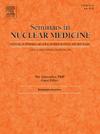人工智能在前列腺特异性膜抗原正电子发射断层扫描中的价值:最新进展。
IF 5.9
2区 医学
Q1 RADIOLOGY, NUCLEAR MEDICINE & MEDICAL IMAGING
引用次数: 0
摘要
本文旨在提供人工智能(AI)在评估前列腺特异性膜抗原(PSMA)正电子发射断层扫描(PET)前列腺癌(PCa)扫描中的最新应用综述。对Medline、Embase、Web of Science和IEEE explore数据库进行了文献综述。搜索的重点是利用人工智能评估PSMA PET扫描的研究。从成立到2024年10月发表的原始英语研究被纳入,而病例报告、系列、评论和会议记录被排除在外。人工智能应用有望在PSMA PET扫描中自动检测转移性疾病和解剖分割。人工智能还能够预测对基于psma的诊断的反应,并有助于肿瘤负荷分割,改善放疗计划。人工智能还能鉴别前列腺内前列腺癌的组织学分级,预测前列腺外扩张。人工智能在评估前列腺癌的PSMA PET扫描方面具有潜力,特别是在检测转移、测量肿瘤负荷、检测高级别前列腺内癌和预测治疗结果方面。需要更大规模的多中心前瞻性研究来验证和增强这些人工智能模型的普遍性。本文章由计算机程序翻译,如有差异,请以英文原文为准。
The Value of Artificial Intelligence in Prostate-Specific Membrane Antigen Positron Emission Tomography: An Update
This review aims to provide an up-to-date overview of the utility of artificial intelligence (AI) in evaluating prostate-specific membrane antigen (PSMA) positron emission tomography (PET) scans for prostate cancer (PCa). A literature review was conducted on the Medline, Embase, Web of Science, and IEEE Xplore databases. The search focused on studies that utilizes AI to evaluate PSMA PET scans. Original English language studies published from inception to October 2024 were included, while case reports, series, commentaries, and conference proceedings were excluded. AI applications show promise in automating the detection of metastatic disease and anatomical segmentation in PSMA PET scans. AI was also able to predict response to PSMA-based theragnostic and aids in tumor burden segmentation, improving radiotherapy planning. AI could also differentiate intraprostatic PCa with higher histological grade and predict extra-prostatic extension. AI has potential in evaluating PSMA PET scans for PCa, particularly in detecting metastasis, measuring tumor burden, detecting high grade intraprostatic cancer, and predicting treatment outcomes. Larger multicenter prospective studies are necessary to validate and enhance the generalizability of these AI models.
求助全文
通过发布文献求助,成功后即可免费获取论文全文。
去求助
来源期刊

Seminars in nuclear medicine
医学-核医学
CiteScore
9.80
自引率
6.10%
发文量
86
审稿时长
14 days
期刊介绍:
Seminars in Nuclear Medicine is the leading review journal in nuclear medicine. Each issue brings you expert reviews and commentary on a single topic as selected by the Editors. The journal contains extensive coverage of the field of nuclear medicine, including PET, SPECT, and other molecular imaging studies, and related imaging studies. Full-color illustrations are used throughout to highlight important findings. Seminars is included in PubMed/Medline, Thomson/ISI, and other major scientific indexes.
 求助内容:
求助内容: 应助结果提醒方式:
应助结果提醒方式:


